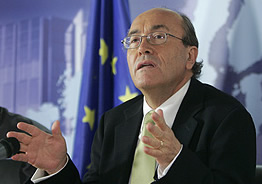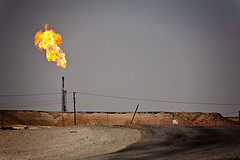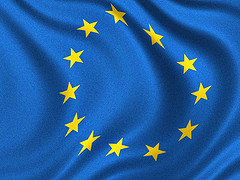The risks of the current approach to Greece and the Euro-crisis
Last week, I debated how much more the Greek nation can take given the enormous internal and external pressures on families, society and the nation. When discussing this with my friend and colleague Pavlos Efthymiou, we realised that some important points were missing and have rewritten the article together (also published on ELIAMEP). Mainstream International Relations (IR) thinking (see Realism, Liberalism) holds that the national interest drives states to act the way they do on the international stage. This post-hoc rationalising to explain policy outcomes works successfully enough to be employed by the majority of policy-makers, academics, and analysts to inform their audiences. However, what they are often missing is how such an interest comes about and what it is …

Towards a Two Speed Europe: Is the Inevitable Preferable?
Last week the Centre for International Studies held an excellent discussion panel (shortly to be made into a podcast) with Jean-Claude Piris (author and former Director General of the Legal Service of the Council Secretariat), discussing his new book, Towards a Two Speed Europe. Jean-Claude Piris, who has worked for many years in the highest echelons of European law-making and treaty formulation, is far more qualified than your blogger to evaluate the various implications of a formalisation of the currently observable divergence in paths of the European centre and its periphery. I shall not, therefore, attempt to evaluate his arguments from the point either of a lawyer or a European policymaker. I’m neither. Rather, I write merely as a citizen of …

Oil wealth after the Arab Spring: A trillion-dollar catalyst for change
At the end of the 19th Century, Lord Curzon, the then British Viceroy of India, described Iran and its Arab neighbours as “pieces on a chessboard upon which is being played out a game for the domination of the world”. The geostrategic importance of the Middle East, with its immense oil wealth, has shaped the policies of colonial empires, secured the longevity of autocratic regimes and given rise to religious elites. The ‘game of chess’, as described by Lord Curzon, promises great riches and influence for the players involved, but has often come at a huge cost for the majority of the Arab people. Indeed, oil wealth, so narrowly shared between the region’s ruling minorities, has historically presented a barrier …

Voters’ Block: Will EU governments hold referendums on a new treaty?
As the European Union lurches from crisis to crisis, the chances of getting a new EU treaty are on the rise. Such a new treaty might be the ‘Treaty on Stability, Coordination and Governance in the Economic and Monetary Union’, which is due to be signed in March by all EU members apart from the Czech Republic and the UK. Or, if the worst fears of the Eurozone countries are realised and Greece defaults, a new treaty will be necessary to clean up the ensuing mess. Although most attention tends to focus on the ins-and-outs of treaty negotiations, once a treaty has been signed it still has to be ratified by each country. And the ratification process has rarely gone …
How much more can the Greek nation take (until it fights back)?
Yesterday Geoffrey Gertz commented in this blog on German Finance Minister Wolfgang Schäuble’s statement on elections in Greece. Indeed solving this crisis will be tough, but perhaps international relations theories can offer some advice on what is needed to address current problems. Part of what is downplayed in recent analysis is the impact of the crisis on national emotions and pride. Realism and Liberal Institutionalism propose that national interest drives states to act the way they do. This type of post hoc rationalising to explain outcomes works successfully enough for academics, policy-makers and journalists; however, what they are missing is how such an interest comes about and what fuels it. Richard Ned Lebow of Dartmouth University published in 2010 ‘Why Nations Fight’. In …
Did the German Finance Minister Seriously Just Suggest Greece Postpone Elections?
I didn’t think it was possible, but the situation between the Greeks and the Germans just grew considerably more ridiculous. German finance minister Wolfgang Schäuble said in a radio interview that the Greeks should postpone national elections planned for April and instead adopt a technocratic government that leaves out the country’s major political parties (h/t Tyler Cowen, who correctly files this under ‘Department of Yikes’, and it’s worth noting that the Finns and the Netherlands are also apparently on board with the German plan). Wow. Due to the Eurozone crisis a lot of things which would have seemed unthinkable a few years ago are now plausible, but even by our new 2012 standards this is just insane. Suffice it to …

The Myth of the ‘Mighty Minnows’: Small nations aren’t the economic successes they think they are (or may become)
Nationalist movements often argue that small countries are more economically successful than big ones. The Scottish Nationalist Party claims that independence would allow Scotland to advance from ‘its subordinate position within the UK, and generate a new prosperity for Scotland’. And former Plaid Cymru MP, Adam Price, who is currently taking a career break at Harvard University, goes further, wrapping the ‘small equals rich’ argument in a cloak of pseudo-academic jargon. Price’s article, published in an on-line student journal, is entitled ‘Small is Cute, Sexy and Successful’. He argues that smaller countries grow faster because they are more open to trade, more socially cohesive and more adaptable. Rather optimistically, Price even argues that differences in population size alone account for ‘mighty minnows’ outperforming the big five (UK, Italy, …
Thinking in old terms: can a structural adjustment programme work in Greece?
Taking a step back from the immediate uncertainty over Greece (see here for the latest updates), I’m struck by how similar the situation is to those created by the old 1980s/1990s IMF and World Bank Structural Adjustment Programmes (SAPs). Reading accounts of the negotiations (especially a story in today’s New York Times about how the Germans, IMF, and ECB don’t trust the Greeks), you could rather easily replace “Greece” with “Nigeria” or “Senegal” and be transported 20 years back in time. We can go down the similarity-list. An urgent need for new official lending to roll over past debts? Tick. Tough loan conditionality attached? Tick. Domestic pushback and questionable democratic legitimacy? Tick. Of course, it’s all playing out more publicly/more quickly …









